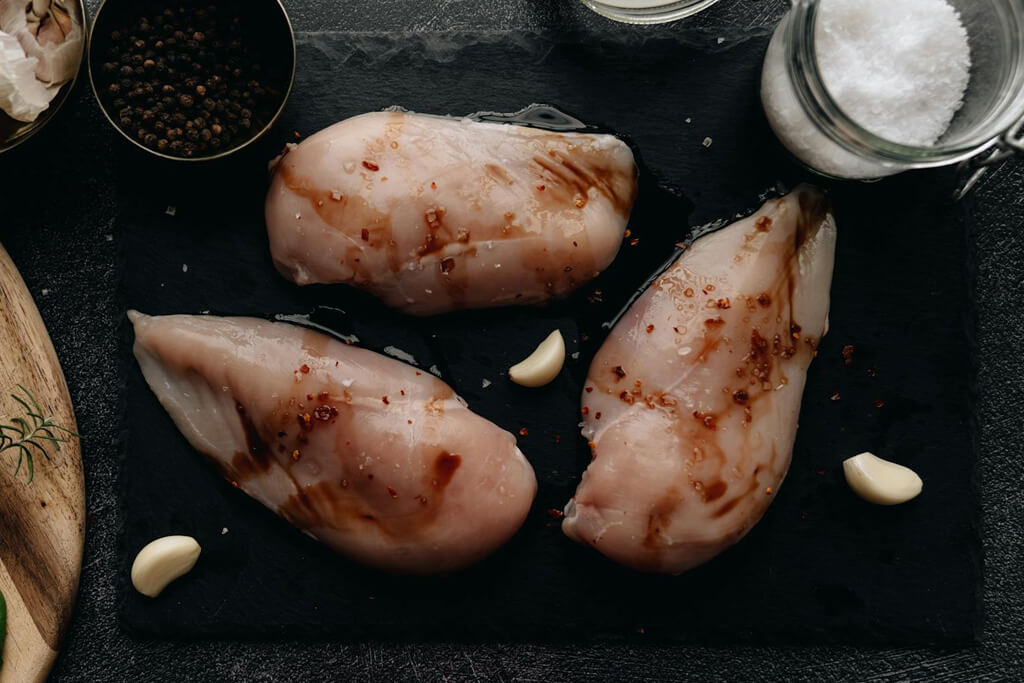We all know that the perfect seasoning routine can make or break a dish, particularly when it comes to meat. But how do we get that juicy, flavourful result that we all crave? The answer, my dear friends, lies in marinades, rubs, and brines.
For centuries these secrets were guarded by noble chefs but today we’ll explore their secret potion-like flavour profiles and discuss how they complement specific meats. We will look at how herbs and spices can be selected to enhance any dish and provide some tips on adding flavour to marinades, rubs, and dishes, so you can make your meal times magical every time.
Marinades
Marinades are often used to embed flavour into tougher cuts of meat like beef. The basic ingredients of a marinade are oil, acid, and flavourings like herbs and spices.
The oil keeps the meat tender, while the acid partially breaks down tough proteins to create a more tender texture. This is important because tougher cuts of meat can be, well, tougher to chew, and that can take away from the enjoyment of eating it. By tenderising the meat, you make it softer and there is something kind of special about soft textures on your tongue. That’s why food manufacturing companies invest billions in creating the perfect texture for new products, especially dessert products and biscuits, but meat is no exception to the rule.
While a little oil like olive oil is used for cooking meat, generally speaking, you don’t need so much for red meat because it has an abundance of fat that provides enough moisture for the cooking and an abundance of flavour. The most common acids are vinegar, wine (non-alcoholic), and citric acid (like lemon or orange juice). But, remember not to over-marinate, otherwise, the meat may become mushy.
As for flavouring, well, that’s where the fun begins. Some of our favourite go-to's include garlic, onion, and rosemary. But perhaps the most important thing to do is experiment with the kind of flavours that you enjoy and make a note of what works and what doesn’t.
Remember, the modern chef has an abundance of choices compared to the chefs of old, so put your chef hat on and don’t be afraid to get your hands dirty with new ideas.
Rubs
Rubs, on the other hand, are less about tenderizing and more about flavour. They’re great for enhancing the natural flavours of meats or adding a layer of complexity as the taste changes in your mouth.
The basic rub includes salt, pepper, and paprika, but you can add a range of spices like coriander seeds, cumin, or smoked paprika. One pro tip when making rubs is to make sure to grind your spices rather than using pre-ground. That way, you’ll get a fresher and deeper tone of flavour. This is because the internal core of the spices is not exposed to oxygen and the grinding releases the natural compounds and oils in their freshest state.
There is no shortage of flavours you can create with rubs, it is only limited by whatever your imagination can conjure.
Here are some basic pairings that are known to work well together
| Meat | Seasoning | Spices/Herbs |
|---|---|---|
| Beef | Bay leaf | Cayenne, Chilli, Curry, Dill, Ginger, Mustard, Paprika, Marjoram, Oregano, Parsley, Rosemary, Thyme |
| Duck | Allspice | Basil, Cardamom, Cloves, Curry, Ginger, Marjoram, Mustard, Oregano, Paprika, Parsley, Rosemary, Sage, Savoury, Thyme |
| Lamb | Basil | Cardamom, Curry, Dill, Mace, Marjoram, Mint, Oregano, Paprika, Rosemary, Turmeric |
| Poultry | Allspice | Anise, Bay leaf, Cayenne, Curry, Dill, Ginger, Marjoram, Mustard, Nutmeg, Paprika, Parsley, Pepper, Sage, Savoury, Tarragon, Thyme |
| Fish | Allspice | Anise, Basil, Bay leaf, Cayenne, Chives, Curry, Dill, Fennel, Ginger, Marjoram, Nutmeg, Oregano, Paprika, Parsley, Tarragon, Thyme |
| Fruit | Allspice | Anise, Cinnamon, Cloves, Curry, Ginger, Mace, Mint, Nutmeg, Pepper |
Brining
Brining is a similar method to marinades, in that you’re adding flavour and moisture to meat but with higher salt content. Brining involves soaking meat in a saltwater solution for a period of time (anywhere from a few hours to a few days) before cooking. The salt helps to break down tough muscle fibres and allows the meat to retain more moisture, leading to a juicier, more flavourful end product. One thing to note when brining is to make sure to rinse off the meat thoroughly before cooking to avoid overpowering saltiness.
You can always add your favourite herbs, especially fresh herbs, when brining and the meat will inevitably absorb some of those rich flavours. It helps to chop the herbs before adding them, so they release their natural flavourful compounds into the solution.
Don’t worry about losing some of the flavours when you rinse the brine off because much of it will have made its way deeper into the meat’s pores. Besides, it’s always best to add some more flavour before cooking anyway.
Final Thoughts
So, there you have it, the culinary art of flavouring meat has been unveiled and now you are ready to be unleashed into your kitchen with the experimentive curiosity of a child ready for play. So, go create, have fun and enjoy the fruits of your labour around the dinner table at meal times.
Here at Halal Origins, we are all about bringing happier moments with loved ones around the dinner table. We love sharing ideas, recipes and of course, the finest quality organic meat. All of our produce comes directly from local farms that truly care ab
If you don’t have the time to flavour your meat and don’t want to miss out on the rich flavours that come with a good marinade, try our marinaded meat options. They are rich with flavour and ready to cook.
For those who do want to get creative, enjoy the tips provided in this post and remember that seasoning is a journey, not a destination.
Happy cooking!

